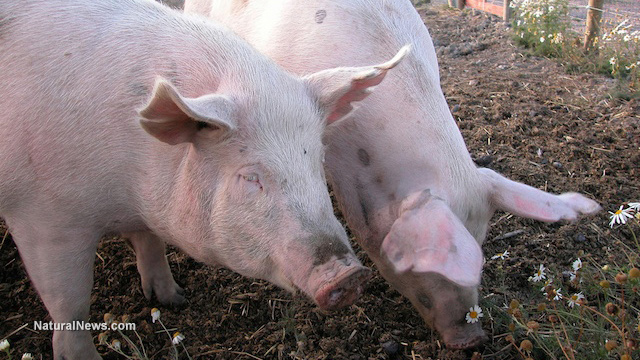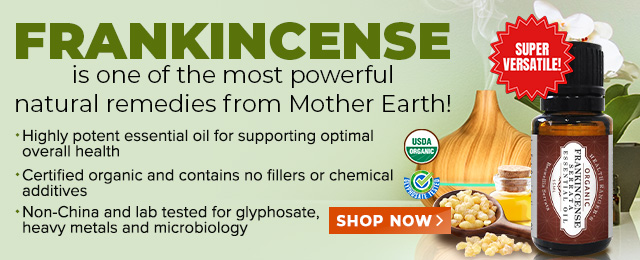Biotech firm aims to bring lab-grown pork to market in five years
Monday, February 15, 2016 by: Daniel Barker
Tags: frankenmeat, GMO foods, health risks

(NaturalNews) Would you eat meat that was 'grown' in a lab?
Several biotech firms seems to think so, and are investing in technology that should make lab-grown meat available for consumers in the very near future. One of these firms has just announced that they will be offering lab-grown beef and pork within a few years.
As reported by Gizmodo:
"San Francisco-based startup Memphis Meats made its public debut today, with a Wall Street Journal exclusive that details the team's ambitious plan to grow beef and pork in laboratory bioreactors—and to be the first company to bring lab-grown meat to market. Memphis Meats says it'll be selling its animal-free products to high-end customers in three to four years. Oh, and to dissuade any lingering doubts, they've also just unveiled the world's first lab-grown meatball."
The technology exists, as entrepreneur Mark Post demonstrated in 2013 with his unveiling of the 'stem cell burger' – a successful experiment that proved that the concept worked, although the first one cost $330,000 to produce.
Since then the cost of producing in vitro meat has dropped considerably – it has been reported that the same stem cell burger now costs only around $12 to make – and Post says that his company, Mosa Meat, will be marketing its own lab-grown beef within five years.
Unsurprisingly, the concept has its detractors, but the Gizmodo article focuses only on those who criticize the idea because they believe it can't be done cheaply enough to replace the real thing:
"Lab-grown meat is one of those futuristic technologies that polarizes people, with some saying it's going to replace animal agriculture and others insisting it'll never be more than a novelty. Most arguments for or against lab-grown meat hinge on whether you buy the claim that we can produce animal tissue in laboratories at a far lower per capita cost than we can growing it the old fashioned way."
The tone of the article seems to hint that the average person would have no qualms in consuming lab-grown meat if it were inexpensive, but I'm guessing that there are millions of people who, like myself, are not only disgusted by the idea, but also concerned that eating artificially-grown beef or pork might carry serious health risks.
Danica Collins of Underground Health Reporter shares the same views regarding 'Frankenmeat':
"Modifying plants is bad enough. Now scientists are taking the future of genetically modified food to a completely different, and startling, level: creating fake lab grown meat. ...
"The side effects of GMO's on crops are slowly coming to light. How will our bodies respond to eating lab grown meat that has been created from animal tissue and grown in a lab?
"Food manufacturers may swear to you that Bt-toxin is safe despite the mounting evidence to the contrary. According to the American Academy of Environmental Medicine, 'Several animal studies indicate serious health risks associated with genetically modified foods.'"
As Collins noted, GMO foods can cause numerous health problems, including weakened immunity, cancer and organ failure.
Supporters of the Frankenmeat concept argue that the scheme would be beneficial due to their belief that artificially-grown meat would have less impact on the environment.
But it can be assumed that those who are gearing up to produce and sell Frankenmeat to the public are far more concerned with making money than with saving the environment. And like the rest of the GMO food industry, the potential health risks are covered up or – at the very least – conveniently ignored.
If these companies succeed in developing and marketing Frankenmeat – as it now seems they almost certainly will – we can only hope that their bogus and dangerous lab-grown products will be required to clearly be labeled as such, so that those who don't want Frankenmeat to be a part of their diet can avoid it like the plague.
Sources:
Gizmodo.com
UndergroundHealthReporter.com
Frankenmeat at FETCH.news
Get independent news alerts on natural cures, food lab tests, cannabis medicine, science, robotics, drones, privacy and more.
Take Action: Support Natural News by linking to this article from your website
Permalink to this article:
Embed article link: (copy HTML code below):
Reprinting this article:
Non-commercial use OK, cite NaturalNews.com with clickable link.
Follow Natural News on Facebook, Twitter, Google Plus, and Pinterest
- European Court of Justice: Healthcare professionals who promoted or administered COVID-19 vaccines are CRIMINALLY LIABLE for any harm caused
- “Old Man in a Chair”: The COVID-19 pandemic was a carefully orchestrated scheme for global control
- Cinnamon plays a critical role in diabetes management
- FRAUD ALERT: Details DEMOCRATS do NOT want you to know about the $40 BILLION wasted on Fed-loaded credit cards cancelled by DOGE
- Scientists unveil breakthrough method to eliminate "Forever Chemicals" from water, transforming waste into graphene
- Newly released JFK files reveal Pentagon's role in creating Lyme disease and covid in the same lab
- Postcard from 1875 highlights smallpox vaccine’s failure: Lessons for today’s COVID-19 response
- Massive egg substitution recall: Bleach contamination sparks nationwide concern
- DOGE finds evidence of Social Security fraud and illegal immigrant voter registration
- AI-powered forecasting model proves more accurate than traditional systems at predicting the weather
- Zelensky defies Trump, rejects U.S. aid repayment and mineral deal amid rising tensions
- Preparing for the unthinkable with William Brocius’ “How to Survive the Death of the Dollar”
- Oncologist warns of ‘terrifyingly aggressive’ cancers in children, linked to immune suppression from COVID vaccines
- World Health Organization in crisis, prepares for DOWNSIZING after U.S. withdrawal and funding problems
- Trump administration deploys spy satellites to enhance southern border surveillance
- Pentagon memo suggests U.S. will not defend Europe from Russian aggression, prioritizing China and homeland security
- Science proves PASSION FRUIT is a powerful medicine for the GUT and the HEART
- EPA reconsiders Obama's CO2 “Endangerment Finding” - could unleash American energy freedom
- Newly released JFK files reveal Pentagon's role in creating Lyme disease and covid in the same lab
- Kiss Your Genetic Privacy Good-Bye! 23andMe Gets Green Light to Sell Your Intimate Genetic Details to Anyone They Want
- Oncologist warns of ‘terrifyingly aggressive’ cancers in children, linked to immune suppression from COVID vaccines
- Analysis: The coming economic collapse, a mass uprising and Trump's three secret weapons to halt the growing revolt
- European Court of Justice: Healthcare professionals who promoted or administered COVID-19 vaccines are CRIMINALLY LIABLE for any harm caused
- Dr. Suzanne Humphries makes bombshell appearance on Joe Rogan podcast, exposing vaccine industry deception back to POLIOMYELITIS
- Woman contracts WORLD'S DEADLIEST VIRUS after unknowingly being given the WRONG VACCINE
- NIH study, buried for decades, reveals that Flu Shots INCREASE elderly deaths, not prevent them
- Sugar-free deception: Artificial sweeteners hijack hunger signals, fuel obesity epidemic, study warns
- CDC finally halts $11 billion COVID funding scam as health officials admit the ‘pandemic’ was a fraud
- AI weather model outperforms traditional forecasts, boosts accuracy by 20%
- Black cumin seed oil emerges as a powerful ally against breast cancer and chronic inflammation
- Musk targets “strangely wealthy” lawmakers in DOGE probe, names Pelosi, McConnell, Schumer
- COVID-19 scandal linked to CANCER SURGE: Billionaire researcher sounds alarm
- “Independent” anti-Russia outlet MEDUZA faces COLLAPSE as US funding dries up
- The Health Ranger releases “Vaccine Zombie” song and music video, using AI-animated zombies for the music video
- DARPA: The shadowy innovator behind the world’s most advanced military technologies
- Britain’s descent into police state censorship: Parents raided for questioning their daughter’s school system online
- Newly released JFK files reveal Pentagon's role in creating Lyme disease and covid in the same lab
- California's social media censorship law struck down: A victory for free speech or a threat to online safety?
- EPA advisor admits the agency is funneling billions to climate groups ahead of Trump’s return to White House
- The Health Ranger releases “Vaccine Zombie” song and music video, using AI-animated zombies for the music video
- Dr. Mike Yeadon releases 15-minute testimony - WATCH - about genocidal intent of COVID “vaccines”
- Florida takes a stand: DeSantis proposes permanent ban on mRNA vaccine mandates
- Mike Adams releases country western hit single: Goin’ Back in Time is Comin’ Home
- Rep. Nancy Mace introduces bill to ban biological males from female facilities on federal property
- Unpacking the Lies That We’ve Been Fed – new song and music video released by Mike Adams, the Health Ranger
- “Why we influenced the 2020 elections”: Facebook files reveal the coordinated effort to bury the Hunter Biden laptop story
- House Intelligence Committee calls for the ARREST and PROSECUTION of Dr. Anthony Fauci
- Sugarcane extract superior to cholesterol-lowering drugs?
- The pandemic as a tool for INDOCTRINATION: Understanding “The Indoctrinated Brain” by Dr. Michael Nehls
- Survival 101: Effective EMF blocking techniques
- Mike Adams releases music poetry sensation: A Child of God
- Peter Rost exposes Big Pharma corruption in his book “The Whistleblower: Confessions of a Healthcare Hitman”
- Migrants are taking advantage of recent hurricanes to scam residents and loot their homes
- Michigan sheriff announces criminal investigation into 2020 election crimes, Dominion Voting Systems
- Red Cross issues warning to stop blood plasma donations from vaccinated people
- Scientists confirm: GENIUS brain function can be spontaneously unleashed in humans without any apparent cause
- EPA advisor admits the agency is funneling billions to climate groups ahead of Trump’s return to White House
- HYSSOP: What research reveals about the health benefits of this ancient holy herb
- Two containers with completed ballots fall out of truck in Florida
- Fully vaccinated about to see “tsunami” of illness and death, warns virologist
- Global leaders unite to clamp down on “misinformation” with UN-backed Cascais Declaration
- BREAKING: 2025 NDAA authorizes mandatory military draft of WOMEN across America… as Pentagon pursues global NUCLEAR war with both Russia and China at the same time
- Michael Yon warns of a ZIONIST TAKEOVER in Trump’s second administration
- Ozempic and Wegovy weight loss drugs are injectable LIZARD VENOM PEPTIDES that may unleash a devastating wave of organ failure… side effects align with symptoms of SNAKE BITES
- BOMBSHELL: DNA testing kits are a SCAM to develop ethnic-specific bioweapons
- Israeli soldiers accused of even more torture and abuse in the West Bank
- These 13 countries just signed an agreement to engineer a global FAMINE by destroying food supply
- NASA admits that climate change occurs because of changes in Earth’s solar orbit, and NOT because of SUVs and fossil fuels
- Newly released JFK files reveal Pentagon's role in creating Lyme disease and covid in the same lab
- RFK Jr. clears key hurdle: Sen. Susan Collins backs controversial HHS nominee, signaling a new era for health policy
- Sermon 30: How Jesus reveals Caesar’s FAKE CURRENCY and FALSE AUTHORITY
- Coriander seeds: Ancient medicine backed by modern science
Science News & Studies
Medicine News and Information
Food News & Studies
Health News & Studies
Herbs News & Information
Pollution News & Studies
Cancer News & Studies
Climate News & Studies
Survival News & Information
Gear News & Information
News covering technology, stocks, hackers, and more



"Big Tech and mainstream media are constantly trying to silence the independent voices that dare to bring you the truth about toxic food ingredients, dangerous medications and the failed, fraudulent science of the profit-driven medical establishment.
Email is one of the best ways to make sure you stay informed, without the censorship of the tech giants (Google, Apple, Facebook, Twitter, YouTube, etc.). Stay informed and you'll even likely learn information that may help save your own life."
–The Health Ranger, Mike Adams












































